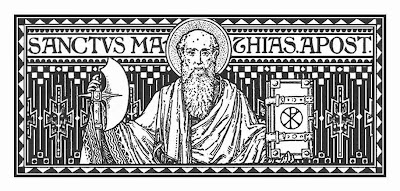Saint Matthias: Authority and Service
We should not seek from others the truth that we can easily receive from the Church. There, the Apostles, like one making a deposit, fully bestowed on her all that belongs to the truth.
In the days between the Lord's Ascension and the descent of the Holy Spirit at Pentecost, Peter urged the followers of Jesus to select from among their number someone to take the place of Judas Iscariot as one of the Twelve. Inspired by the Psalmist, "Let another take his office" (Psalm 109:8), those present nominated two men: Joseph Barsabbas and Matthias. Under the inspiration of the Holy Spirit, Matthias was chosen (Acts 1:15-17, 20-26). According to tradition, Matthias preached the Gospel in Cappadocia and the area around the Caspian Sea. Honored as a martyr, his relics were brought from Jerusalem to Rome by Saint Helena.
 |
| A vintage missal illustration for the Feast of Saint Matthias |
In reflecting on the importance of the Apostles, Saint Augustine notes that Jesus himself declared that the Apostles would sit on twelve thrones, "judging the Twelve Tribes of Israel" (Luke 22:30). Augustine goes on to say that these twelve seats are a "sign of a certain universality, for the Church was to be spread through the whole world, from whence, then, this edifice is called to union with Christ" (Commentary on Psalm 86).
The Feast of Saint Matthias (May 14; coincidentally, this year it is the same day when many in the Church observe the traditional celebration of the Ascension of the Lord) invites us to reflect both on the unique call that each of us has received, but also on the call to apostolic unity and authority that has been entrusted to the Church's bishops, the successors of the Apostles. However, this authority finds its origin in the universal call to holiness that has been extended to each of us by Jesus himself: "As the Father has loved me, so I also love you. Remain in my love... It was not you who chose me, but I who chose you and appointed you to bear fruit that will remain, so that whatever you ask the Father in my name He may give you" (John 15:10, 16, the Gospel for the Feast of Saint Matthias).
In his reflection on Saint Matthias given at the General Audience of October 18, 2006, Pope Benedict summed up what can be said of this Apostle: "We know nothing about him, if not that he had been a witness to all Jesus' earthly events (cf. Acts 1:21-22), remaining faithful to the end. To the greatness of his fidelity was later added the divine call to take the place of Judas, almost compensating for his betrayal." He concluded, "We draw from this a final lesson: while there is no lack of unworthy and traitorous Christians in the Church, it is up to each of us to counterbalance, the evil done by them with our clear witness to Jesus Christ, our Lord and Savior."
In his reflection on Saint Matthias given at the General Audience of October 18, 2006, Pope Benedict summed up what can be said of this Apostle: "We know nothing about him, if not that he had been a witness to all Jesus' earthly events (cf. Acts 1:21-22), remaining faithful to the end. To the greatness of his fidelity was later added the divine call to take the place of Judas, almost compensating for his betrayal." He concluded, "We draw from this a final lesson: while there is no lack of unworthy and traitorous Christians in the Church, it is up to each of us to counterbalance, the evil done by them with our clear witness to Jesus Christ, our Lord and Savior."
A prayer for the Feast of Saint Matthias +
O God, who assigned Saint Matthias
a place in the college of Apostles,
grant us, through his intercession,
that, rejoicing at how your love has been allotted to us,
we may merit to be numbered among the elect.
Through Christ our Lord. Amen.
(from The Roman Missal)
This reflection is adapted from my book, From Season to Season: A Book of Saintly Wisdom.
O God, who assigned Saint Matthias
a place in the college of Apostles,
grant us, through his intercession,
that, rejoicing at how your love has been allotted to us,
we may merit to be numbered among the elect.
Through Christ our Lord. Amen.
(from The Roman Missal)
This reflection is adapted from my book, From Season to Season: A Book of Saintly Wisdom.



I am going to use this with my boys during our Morning Gathering to start our homeschool day! Great information-thanks for sharing!
ReplyDelete